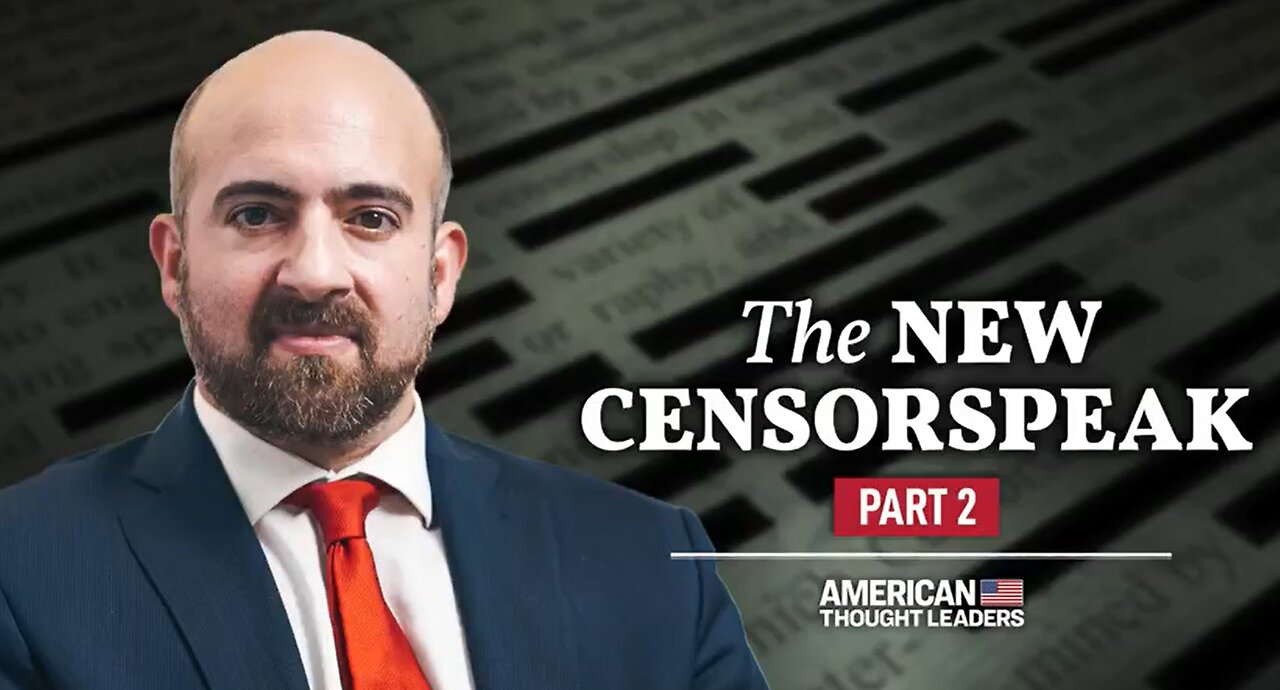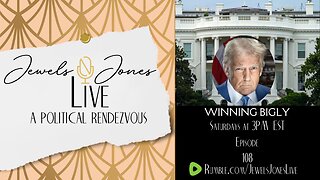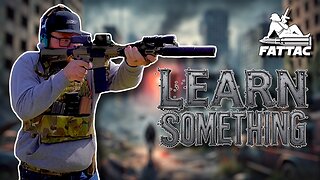Premium Only Content

Mike Benz (Part 2): How the ‘Department of Dirty Tricks’ Turned on Americans - February 4, 2023
Jan Jekielek - American Thought Leaders
Previously, in part one of my interview with Mike Benz, he explained the existence of a “whole-of-society” censorship industry in the West. Benz has been tracking the rise of censorship for years as executive director of the Foundation for Freedom Online and a former State Department diplomat.
Now in part two, Benz explains how tools originally developed to promote regime change were deployed against Americans.
“What you are doing in a regime-change operation is you are operationalizing huge masses of an indigenous or domestic population in order to create a ground-up overthrow of a sitting government. And in order to do that, you need to control the media infrastructure, you need to control the narratives that people believe. … What was new is that in 2016, this began coming home,” Benz says.
Changes in America also corresponded with changes in the broader Western world, Benz says. “There became a whole new military doctrine—it’s not a new concept, [but] I think it was given a new name—called hybrid warfare. NATO declared a new doctrine called ‘from tanks to tweets.’”
And a whole new lexicon emerged to describe the new censorship regime, Benz says, from “digital resilience” to “media literacy” to “moderation” and “intervention.”
“Whoever can control the Department of Dirty Tricks is able to use it to remove all opposition,” Benz says.
Missed part one? You can watch it here.
https://www.foundationforfreedomonline.com
FULL TRANSCRIPT
Jan Jekielek:
So, a couple of quick thoughts. Number one, Russia essentially became a code word for Trump. The second thing, this was all being done in the name of protecting democracy, if I recall. This is how it’s all being explained.
Mike Benz:
Right. Democracy is a fascinating word, both historically and in the context of the development of the censorship industry. Obviously, the thing that makes democracy the underpinning of the American governance system is this idea that government exists to serve the people. It’s legitimized and it’s consent by the governed. That is, the government exists because the governed people consent to it, and it is their consensus that they want the government to do what it’s doing that way. That’s how we know that the government is serving us, rather than we are serving an overlord government.
Democracy has been a rallying cry for the U.S. foreign policy establishment to use the Department of Dirty Tricks, if you will, for purposes of regime change and regime stabilization as a matter of foreign policy around the world, and as part of the management of the American world empire. By the way, I should say, as somebody who’s had a career in the foreign policy establishment, I do not have a problem with that normatively. There are reasonable opinions on both sides about the necessity of regime change or counterinsurgency in various regions. I don’t go there.
My concern is over censorship and digital freedom and when the concept of using democracy as a pretext for regime change comes home and is used as part of a pretext for the regime change of a U.S. president on democracy grounds and using the same toolkit of the regime change context where control over media is absolutely essential. Because what you are doing in a regime change operation is you are operationalizing huge masses of an indigenous or domestic population in order to create a ground up overthrow of a sitting government.
And to do that, you need to control the media infrastructure. You need to control the narratives that people believe, because you need them to believe that their government is evil or illegitimate or tyrannical, in order for them to overthrow that government. In that context, when there’s a democracy threat, it creates a predicate for controlling the media in that territory. There are various ways that the U.S. State Department and various assets can be deployed on the media side and in the foreign context.
What was new is that in 2016, this began coming home. This foreign to domestic switcheroo was done in the media context through several mechanisms, by the creation and the government funding of these professional censorship groups that were essentially cutouts of the U.S. State Department, or the U.S. Defense Department, or DHS. The so-called threat to democracy from social media fueling populism was a common slogan by which all the different stakeholders in the foreign policy establishment could ban together to say, “There’s a common threat we all face, whether we’re Democrats associated with the National Democratic Institute or Republicans associated with foreign policy links like the International Republican Institute. We’re not threatened by liberalism or conservatism, because that’s a partisan thing.”
“But if we’re commonly threatened by democracy, we can use that as our common rallying point for us all to pour those resources in together.” Though what happened was they needed to create this new definition of democracy to justify censoring in the name of democracy. Essentially how they did that was by defining democracy as not being a consensus of individuals, and reflected by how people vote, but rather by defining it as a consensus of institutions. That is, what institutions prefer.
This is a conceptual sleight of hand that is extremely dirty if you think about it at any level of depth. And by the way, you‘ll see this in strange places the moment you start looking for it. You’ll see, even early on in 2017, 2018, you had military and intelligence and foreign policy folks writing op-eds that there need to be more guardrails on even who you can make eligible to become president. There should be a 15-person panel comprised of senior military and intelligence folks who vet a person before they can even go through the process of being nominated for president.
It was this idea that democracy should not be left up to the masses of people. There should be guardrails that make sure that the national security and the foreign affairs wings of the foreign policy establishment can basically pick the pool of people that the masses can have a say on. That is, the institutions get the first cut, and then the masses get the remnants. This was the redefinition of what democracy means to the foreign policy establishment.
The moment you understand that’s how they see things, you can see how they say that social media freedom is a threat to democracy. Because to them it’s not a democracy of what 10,000 people in Wisconsin think. It’s what Harvard and MIT and the Council of Foreign Relations and the Atlanta Council and NATO and the World Economic Forum, and the Department of Homeland Security—it’s what these institutions collectively prefer. And so, threats to the institutional consensus at the individual level are a threat to democracy. This was the predicate by which you had the national security state descend on social media.
Mr. Jekielek:
I can’t help but think that this all started happening during the Trump administration, which you eventually became part of.
Mr. Benz:
It did start a little bit before that. I would argue that the infrastructure for the foreign to domestic switcheroo technically started, if you were to pick a clean start point, I would describe it as being right after the Crimean annexation vote in early 2014. That was when the Obama administration’s State Department and Defense Department and the foreign policy establishment decided that internet free speech was a serious problem in a foreign context. That is, hearts and minds in an internet free speech context could decide to vote against American interests.
Up until that point, internet freedom had always been something strongly backed by the U.S. government, because it was so instrumental in having low-cost regime change. You simply flood a zone with hashtags and Facebook groups and influencers that have a relationship with the U.S. State Department, and then you’re able to have an instant revolution like the Arab Spring. But what happened in 2014 is that backfired in some respects, and that created a whole new military doctrine.
It’s not a new concept, but it was given a new name called hybrid warfare. NATO declared a new doctrine called “From Tanks to Tweets,” saying NATO is no longer about tanks in traditional warfare. It’s about political control over the covert NATO countries. And so, our new remit, and in fact right after the Brexit vote in June 2016, the very month after, in July 2016, at the Warsaw Conference, NATO essentially created an addendum to now engage in hybrid warfare as one of their core capacities. And it was these hybrid war centers that actually became the initial censorship industry professionals.
For example, the Atlanta Council’s Digital Forensics Research Lab was one of the four entities that DHS partnered with to censor your opinions about the 2020 election. They got their start in that interstitial period between 2014 and 2016, when they were doing early censorship work for NATO as part of the hybrid warfare doctrine. The problem was, in 2016, when Brexit and the Trump election happened, that infrastructure already had two or three years of prior development, and it simply moved westward to Britain and to the U.S. homeland.
Now, the Trump administration was not aware of this. And I considered that to be my sacred duty during the Trump administration when I was at the White House. I was doing my morning pilgrimage through the various offices trying to tell people. I remember going over to the budget office and telling the budget folks, “We have to stop the government grants of all these different institutions that are censoring an in-process election.
We pulled up the grant pages and everyone said, “Hey, there’s no grants for censorship here. What are you talking about?” I said, “No, look, they’re calling it media literacy and digital resilience.” You have to be able to understand censorspeak to know how they laundered all of this, because they know what they’re doing is dirty. They know that they can’t call it what it is. Part of the function of the academic underpinnings is what Stanford and MIT and Berkeley’s Data Lab does. It is to create a new dictionary of terms that can be used. It’s not censorship.
First, it was content moderation. Now, they use a new term called intervention, this idea that we’re actually not censoring what you’re saying, we’re intervening to prevent you from hurting yourself with what you might say. Media literacy is a way of saying, “We’re not censoring you. We’re simply getting you to be literate about what kinds of media you have access to.”
For example, if you read CNN” or The New York Times, you’re media literate. If you read, Breitbart or watch Fox News, you are media illiterate. They say, “As part of our media literacy programs, we’re going to help social media companies contextualize low information integrity media literacy threats,” like Tucker Carlson’s show having normal distribution access on Twitter. It’s all done through a laundering apparatus, which by the way is the bread and butter of how foreign policy operations work.
When the CIA does an operation in Nicaragua, they don’t come out and say, “Hello, we’re a foreign intelligence service.” The laundering process is when there’s the use of front companies, there’s the use of creative terminology, and when there’s a whole branding and media effort. These are professionals doing a professional job with professional PR, and professional crisis communications. They’re simply doing domestically what they have been empowered since the 1940s to do abroad, except now it’s coming to Boston instead of Baghdad.
Mr. Jekielek:
As you said during the Trump administration, there was this powerful use of AI, which just hadn’t existed before, where you could stop speech in its tracks basically.
Mr. Benz:
Right. Technically, that AI was in its early stage of development during that 2014 to 2016 period, for a slightly different reason. In the run up to the Obama administration’s military interventions in Syria, there was a dramatic concern or media escalation of the concept of homegrown ISIS threats, the idea that ISIS was growing in popularity on Twitter and Facebook, and they were recruiting there.
At the time, DARPA [Defense Advanced Research Projects Agency], began really pouring money into funding for the use of natural language processing, machine learning, artificial intelligence-powered censorship capacities, and repurposing things that were done in the advertising space. If you’re doing brand analysis, if you’re a high-end luxury brand and you want to know what people are saying about Dior handbags on Twitter, there existed for some time the capacity to essentially scrape public conversations through using keywords, through using mapping networks, and through aggregating big data in order to create network maps of who’s saying what about your brand, and then using that for purposes of ad targeting and attribution.
DARPA basically took that commercial concept and said, “Hey, you know what? Let’s use this for counter-terrorism purposes and instead of amplifying or doing ad targeting, we’re going to use that to help do censorship of ISIS on Twitter and Facebook.” And so, universities started receiving a tremendous amount of military funding to have military grade censorship capacities to take out ISIS.
What happened was, in 2016, you went straight from ISIS being the target, to MAGA being the target. And it wasn’t just MAGA, I don’t consider this to be a partisan thing. I don’t have empirical evidence that this was used against Bernie Sanders or Jeremy Corbyn or Left-wing populist groups, but I would be surprised if that was not the case. But the fact is, the AI story did start before 2016, but the chickens had not yet come home to roost on it.
That is, it was still a part of the foreign policy toolkit, the things that we do abroad because it’s terrorism, and because it’s foreign policy. But we don’t do this to Americans because Americans have free speech, and Americans have constitutional protections, and Americans have due process. That social contract was irreversibly broken after the 2016 election. The task now is to create a new social contract that really begins with a reckoning of what has happened.
Mr. Jekielek:
I definitely want to talk about that, but the obvious thing to talk about is what was being done to prevent ISIS recruitment, which is presumably the purpose of what you’re describing. Basically, there are very real threats out there. We’re in this place, and this is incredibly disturbing now. You have significant disinformation operations coming out of communist China that are targeting Americans specifically, and it’s something that we track. These threats exist and they’ve existed before and there needs to be some way to counter them. And these tools were ostensibly created to deal with that in some way, so it almost feels like an intractable problem. Do we give up on all of that?
Mr. Benz:
This is why earlier in our conversation here, I said that I tried to be agnostic on that, because it is a very complicated issue. It wasn’t until 2016 that we even had to grapple with the issue of this being so intentionally directed inward. I actually don’t find it to be an ethical quandary, because I don’t consider this to be an edge case. There are edge cases at certain times when the distinction between foreign and domestic is blurred, especially in a globalized world with a totally free and open internet. If someone retweets you from Mexico, that’s not fundamentally different than someone retweeting you from Montana.
But what was done in this case was so dirty, so out in the open, and so known at the time that it was a lie. I'll give you a great example. On January 6th, 2017, the Central Intelligence Agency produced their first piece of literature on Russian interference in the 2016 election. This set the stage for this inter-agency consensus that Russia had tilted the election in favor of Trump.
Now, this was a highly touted finding at the time. It was all the clout, all the significance, all of the power of the white shoe, top of the food chain foreign intelligence service for the United States of America having an unambiguous, total agency consensus that Russia had interfered in the election with this so-called detailed 15-page memorandum, setting forth all the different ways Russia had done it.
I read that report the day it came out. It was totally stunning in its complete absence of any sort of detail. All it had to corroborate all the flowery language and filler talk was an appendix at the very end, which said, RT, Russia Today, and Sputnik, the Russian radio channel, essentially had higher than expected engagement on Twitter and Facebook, and on their YouTube channels.
When you compare their growth rates to growth rates at the BBC and other publicly funded national broadcasters of foreign governments, they had high levels of engagement. All the talk about the kinds of interference operations that 14 pages of the memo, 13 pages of the memo had referred to were completely divorced from what they actually put as their findings. It was not true. They didn’t have evidence the entire time.
None of this was an edge case. None of this said, “We’ve got evidence that Russia had spent $10 billion on social media.” Even all that was alleged. All that was alleged was a hundred thousand dollars in Facebook ads. That’s less than a single middle class person’s salary in the United States of America. A hundred thousand dollars.
Clint Watts, who is the DHS’s advisor on censorship for the 2020 election, gave keynote speeches for CISA [Cybersecurity and Infrastructure Security Agency]. One of his censorship advocacy pitches was that if we don’t censor social media, people on social media will vote for the wrong president. He said that at a CISA disinformation conference in the fall of 2020. To use that as the predicate for this foreign to domestic switcheroo—I don’t think we need to go anywhere near that ethical quandary.
Mr. Jekielek:
The implications of having these systems that traditionally would target foreign threats turned inward domestically, means that the whole system has been upended. Is that what you’re saying here?
Mr. Benz:
What it means is that the foreign policy establishment has seized long armed jurisdiction over all things domestic. What really happens here is whoever can control the Department of Dirty Tricks is able to use it to remove all opposition on the political, social, and cultural side. This is why I come back to the conflict between the foreign policy establishment and populist political forces.
Because when you really pierce through to the soul of the funding and the specific types of conferences where censorship thought leadership is done, or consensus building is manufactured, it really is in these trans-Atlantic foreign policy hubs where you’ve got representatives from the national security state, and then from the political and commercial stakeholders in the foreign policy establishment.
What populist folks threatened to do as they began to be legitimized through social media in 2016, was to actually have their own domestic concerns addressed at the expense of foreign policy stakeholders. Domestic populists don’t have access to the Department of Dirty Tricks. There’s no domestic central intelligence agency, if you will. There’s no domestic equivalent, other than DHS, you might argue, to the State Department or to various kinds of diplomatic or defense or intelligence spheres.
The domestic faction has things like interior, agriculture, labor, housing, and urban development. These are the nuts and bolts of what’s happening on your street corner. You don’t have access to tanks or to advanced logistics or to entire howitzers of media assets. Prior to 2016, the foreign policy establishment wasn’t particularly concerned with what the domestic populace thought about in their own neighborhoods.
Before the manufacturing heartland turned into the Rust Belt, there was no real beef between the heartland and the foreign policy establishment when it came to what blue chip companies were doing in China or outsourcing of jobs or manufacturing. It wasn’t really until the 1990s that there became even the beginnings of a financial, a commercial and in some sense a cultural cleavage between the domestic populace and the foreign policy establishment.
There was conflict in the 1990s politically on both the Left and the Right, with establishment versus base elements of the Republican and Democrat parties, that was effectively neutralized during the Clinton administration, the Bush administration, and the Obama administration. It came back with a vengeance on both sides of the Atlantic through Nigel Farage’s movement with Brexit and through the Trump movement; the idea of serving the forgotten person, bringing back manufacturing, closing up a border, and having national sovereignty. All of these things had a connected underside at every single level that was consolidating power back into domestic forces, and taking that power from what used to be the domain of foreign policy.
What I’m trying to say here is you have a situation where the foreign policy establishment has cracked open that Department of Dirty Tricks. Now, they do care about what domestic populists say about what’s going on in their own neighborhood. They do care about the domestic drivers of that, because if domestic populists get into power, they will vote. If they have any success on any metric whatsoever, it will undermine the political will for the foreign policy side.
We see this happening right now with the Freedom Caucus of the GOP. The crux of the speaker’s fight with Speaker McCarthy was Matt Gaetz and the Freedom Caucus folks holding out for days in heated negotiations to get this reduction in military spending, so that it could be repurposed for domestic purposes. The foreign policy establishment didn’t want that. The foreign policy wing of the Republican party didn’t want that.
They had to fight to the bone to get that concession on reduced military spending. You can understand from that perspective why certain factions within the U.S. military establishment, the U.S. State Department, and intelligence folks wouldn’t want Matt Gaetz to have any success whatsoever. Because the more he succeeds, the more clout he has, the more pressure he can put on Kevin McCarthy, the less success the foreign policy establishment has. So, that’s a clarifying example.
Mr. Jekielek:
Since we’re jumping into this, explain to me what is the significance of the subcommittee on the weaponization of the federal government, which is a product of what you just described.
Mr. Benz:
It is long overdue. It’s something I’ve been calling for from within the White House for several years. There’s a certain poetry to this weaponization on a federal government subcommittee that’s being housed within the House Judiciary Committee, and which some people are calling Church Committee 2.0. There’s certain poetry between that and the original Church Committee 1.0 in 1975. You had the development of a powerful and consolidated intelligence capacity in the U.S. government in World War II, and then consolidated through the 1947 National Security Act in 1947. And then, you had 30 years essentially of no brakes on that train.
As it accrues more and more power, and you had this statutory grant of power get even more power through things like the NSC 10-2 [National Security Council Directive 10/2], which basically gave it all sorts of teeth. As more and more powers were given to the national security state, more and more abuses started happening to political dissidents domestically from entities that were only supposed to operate on foreign soil.
You had situations in the 1960s when the CIA was doing battle with international communism. One of the things that came out was they were actually funding student groups on U.S. college campuses, operating domestically, running student newspapers, paying the National Student Association, and infiltrating college kids. And this was something that there was no oversight for. This capacity existed for 20 years, but there had never been any congressional investigation. There had never been any opening up the box to see all the dirt inside.
In the analog sphere, the Church Committee, it’s a complicated topic. There was a lot that was left undone. There are fairly persuasive arguments that some elements of it were incomplete, or you might even argue a whitewash. But the fact is, there was essentially a two-year set of open hearings that were dramatic and powerful. They were so impactful that they actually helped bring Jimmy Carter to power.
At the time, the FBI, the CIA, the NSA, and the IRS, which were the four targets of the original Church Committee, were being weaponized against Left wing groups, because they were the ones challenging the foreign policy establishment. They are the ones who would primarily be anti-war protestors, and the anti-imperialists. And so, you had this FBI, CIA, NSA, and even IRS convergence on those groups. It engendered a tremendous amount of political ire in the political Left at the time. They voted Jimmy Carter into power, partially on the basis that Jimmy Carter was going to reign in the intelligence services.
And in fact, Jimmy Carter did that. He laid off 33 per cent of the entire operations division of the CIA. The operations division is really the beating heart of our foreign influence capacity. Now, he ended up getting in trouble with the Iran hostage situation in 1979. And then, Ronald Reagan inherited this situation of intelligence still having this sort of dirty name from the Church Committee hearings, but he still wanted to have this powerful foreign capacity. A lot of that was privatized through cutouts like the National Endowment for Democracy.
We have no Church Committee equivalent for the digital age. In 1991, the world wide web came out. The internet was privatized, and you started to have the intelligence services, the diplomatic spheres, and the foreign policy establishment getting into the internet game. The abuses were really few and far between up until 2016. But we’ve now had many years of this Department of Dirty Tricks operating with no congressional transparency, with no one using subpoena power to pry open the agencies, and with nobody holding up the equivalent of the heart attack gun like Frank Church did with James Angleton during the Church Committee hearing. There has been no equivalent of, “We’re going to show the dirty laundry, not to discredit you, but actually to restore faith in you.”
The idea behind the Church Committees was not to disband the FBI and the CIA and the NSA. It was to reckon with where the American people were. “You’re not going to get back our trust unless you come clean about what you’ve done, or at least a substantial portion of it.” This is a difficult thing, because by nature, these are clandestine service operations. And even when what they’re doing is not clandestine in terms of its operational jurisdiction, they’re still under the cloak of secrecy because of national security.
Basically, what Congress said at the time is “Because we need you, we need to know your dirty secrets. The American people need you, because otherwise we can’t trust you going forward, so we need tough love, essentially. We need to embarrass you in order to believe in you again.” And it’s my contention that is needed now for the digital age, and that’s really the only way that trust can be restored.
Mr. Jekielek:
When you were speaking earlier, it sounded like a lot of people were not really listening to you. Has that changed at all?
Mr. Benz:
I would say so. I do think that some of it just became so self-evident over time, that you really didn’t have much choice. You can believe me or not, if I tell you the oxygen is running out of the room. You get to a point where the air is so thin that you can’t breathe anymore, and that is what’s happening now. But for Elon Musk’s acquisition of Twitter earlier last year, there were no breaks. Things were getting so bad so fast, and there were no outlets whatsoever. There were no shared internet platforms that had all institutions of society onboard.
Even at the commercial level, you started having people who were not political, people who were just cultural commentators, sports figures, and people who didn’t do politics for a living started to lose their bank accounts. They started to not have access to apps like Airbnb or Uber because of their opinions on a public health epidemic. I think people are listening now because the political angle has merged with the social and cultural one in a way that they are now no longer distinct things, such that they are no longer their own fields, in that sense. It is part of how people go through their day, because what they say online could now jeopardize their entire livelihoods.
Mr. Jekielek:
As we finish up, is this your vision for how to fix things, to have a Church committee 2.0, and then this will solve the issues? Where do things need to go?
Mr. Benz:
It’s one component of a whole of society approach that has to be taken to internet freedom. Just as a whole of society approach was done on the censorship side, it’s a network attack and it requires a network defense. Strange bedfellows may need to bind together. I forget the quote, it may be from Ronald Reagan, who said during the heat of the Cold War that maybe the one thing that could unify humanity is a new threat from aliens or something that would get everyone together as a common humanity.
There is an aspect through which people who believe in freedom are truly going to need to merge elements of government, private sector, civil society, and news media into a common effort to restore free and open internet using any and all assets available, even strange and creative ones that are not normally fit to such purpose. The Church committee 2.0 is absolutely vital and essential, even if only for symbolic purposes, to signal to people throughout civil society, throughout the private sector, and throughout other institutions that Congress is serious and public about this, and that they have your back.
Washington is not all against you. Washington is not all on the side of censorship. You have the judiciary, the committee for rule of law who is on team freedom. That’s a very powerful signal, it emboldens people. It makes people take risks for freedom. The people who are afraid for their careers have husbands, wives, children, college funds, cocktail parties that they might lose, uncles who may not talk to them, and friends who might abandon them.
It is a hard road to fight for freedom. There is no lobby for the American people. When people take an ideological stance for freedom and for little people, you are on your own in that. Every person who goes through that journey of fighting for that, experiences the isolation of that. To know that you’ve got a chairman like Jim Jordan, you’ve got respected, influential legislators who are going to have your back is vital to that. And I do think having that run as the Church Committee did as a multi-year thing, until we get to the bottom of it, will be a cleansing process.
Mr. Jekielek:
Given everything you’re describing here, there’s still a substantial portion of the American population who doesn’t see what you’re describing, or maybe doesn’t want to see what you’re describing, and is ready to accept the legacy media narratives on reality. How do we deal with that?
Mr. Benz:
The free and open internet was a rare instance of true information democracy and meritocracy in world history. Rather than losing hope that this monstrous, tyrannical system is all powerful and has seized control over things as basic as what you can say when you open your mouth, I would say take a minute to appreciate just how incredible it was that these freedoms opened up to the world. You could be some poor kid in Bangladesh who’s got a great idea and if you’ve got access to a free and open internet, you could end up becoming a YouTube influencer with 10 million followers and have a level playing field with institutions like The New York Times in an instant.
That’s something that came out of nowhere, essentially, with the development of a free and open internet, and only recently began to be batted back on. What you start to see when you start fighting for this is, although it is a lonely road at times, you make a lot of friends along the way, and often from places that you wouldn’t expect. The process of being proud, and brave, and public in this fight is something that can actually cure the isolation and can cure the feelings of depression or helplessness that can come from simply accepting things the way they are, and feeling like you can’t change it.
Mr. Jekielek:
Michael Benz, it’s such a pleasure to have you on the show.
Mr. Benz:
Thanks so much for having me.
Mr. Jekielek:
Thank you all for joining Michael Benz and me on this episode of, “American Thought Leaders.” I’m your host, Jan Jekielek.
-
 47:06
47:06
InnerLight
11 months agoMike Benz (Part 1): The West’s Burgeoning Censorship Industry and the Government Funds Pouring In – From DHS to DARPA to National Science Foundation - February 4, 2023
6.26K5 -
 54:05
54:05
TheGetCanceledPodcast
7 hours ago $8.60 earnedThe GCP Ep.11 | Smack White Talks Smack DVD Vs WorldStar, Battle Rap, Universal Hood Pass & More...
75.7K18 -
 13:37
13:37
Exploring With Nug
11 hours ago $5.17 earnedSUV Found Underwater Searching For Missing Man Jerry Wilkins!
50.9K2 -
 2:58:21
2:58:21
xBuRnTx
6 hours ago1st Warzone Stream Online
33.7K2 -
 6:10:21
6:10:21
JdaDelete
1 day ago $3.27 earnedDino Crisis - Sega Saturday
52.2K4 -
 23:22
23:22
MYLUNCHBREAK CHANNEL PAGE
1 day agoUnder The Necropolis - Pt 5
58.4K27 -
 2:26:11
2:26:11
Jewels Jones Live ®
2 days agoWINNING BIGLY | A Political Rendezvous - Ep. 108
125K44 -
 2:04:49
2:04:49
Bare Knuckle Fighting Championship
4 days agoBKFC FIGHT NIGHT MOHEGAN SUN FREE FIGHTS
57.8K7 -
 25:09
25:09
BlackDiamondGunsandGear
9 hours agoYou NEED to be Training For Whats to Come
40.3K11 -
 20:03
20:03
Sideserf Cake Studio
15 hours ago $1.60 earnedA HUNGRY HUNGRY HIPPOS CAKE THAT ACTUALLY WORKS?
39.6K13